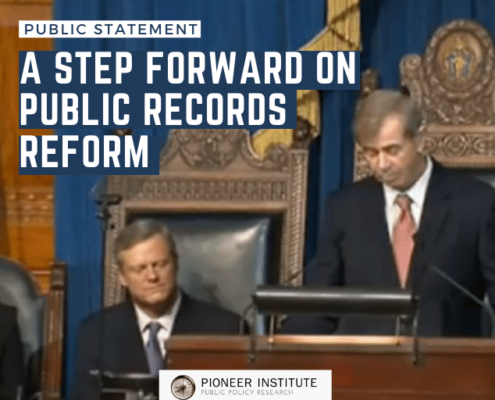Study Finds Revived Merit Rating Board Taking Steps to Carry Out Statutorily Mandated Duties
Board’s adoption of regular meeting schedule appropriate in light of enabling statute; study calls for review of other legislatively created boards or committees
BOSTON – The Merit Rating Board’s recent adoption of a regular meeting schedule and related resolutions is an important step in light of that Board’s 1976 governing statute, according to a new study published by Pioneer Institute.
“After several years of inactivity, the Merit Rating Board appears to be embracing its statutory role, and this would be an opportune time to look for similar situations elsewhere in state government,” said David S. Clancy, author of “The Merit Rating Board: Review and Recommendations.”
The former director of the MRB was terminated in August, two months after a Massachusetts driver whose license should have been suspended caused a tragic collision that killed seven motorcyclists in New Hampshire. The incident led to disclosure of widely reported administrative problems within the Registry of Motor Vehicles, among them that thousands of paper driving records from other states sat, unprocessed, with administrative personnel of the Merit Rating Board.
The accident also led to public awareness of the Merit Rating Board’s structure, particularly its governing panel. Section 57A of Chapter 6C of Massachusetts General Laws specifies that the Merit Rating Board “consist[s] of” three public officials – the registrar of motor vehicles, the commissioner of insurance, and the Massachusetts attorney general or her designee.
That panel, which apparently had not met since 2015, has recently met twice and taken multiple other steps, including adoption of a regular schedule for frequent meetings, work toward finding a new permanent director, and a request for Inspector General review and assistance.
These corrective actions are consistent with the terms of the governing statute, initially enacted in 1976, which provides for appointment of a director, but also charges “the board” as a whole with formulating and administering “a plan for compiling, gathering, and disseminating” information about accidents, insurance claims and motor vehicle violations “as it deems necessary or appropriate to facilitate” the Massachusetts Safe Driver Insurance Plan.
The study makes several recommendations, including enhanced public disclosure of the structure and activities of the board, and a broader review of state government with an eye to whether the corrective steps being taken at the Merit Rating Board are needed at other state boards.
About the Study’s Author
David S. Clancy, a resident of Concord, Massachusetts, is a partner in the law firm Clancy & Shine LLC, which focuses on civil disputes. Mr. Clancy was previously partner at an international law firm, from which he retired after a 20-year career, also practicing civil litigation. Among other professional activities, Mr. Clancy served three terms on the Board of Editors of the Boston Bar Journal, and has published multiple articles in that and other legal publications.
About Pioneer
Pioneer Institute is an independent, non-partisan, privately funded research organization that seeks to improve the quality of life in Massachusetts through civic discourse and intellectually rigorous, data-driven public policy solutions based on free market principles, individual liberty and responsibility, and the ideal of effective, limited and accountable government.
Get Updates on Our Pioneer Public Initiatives!
Related Posts:









